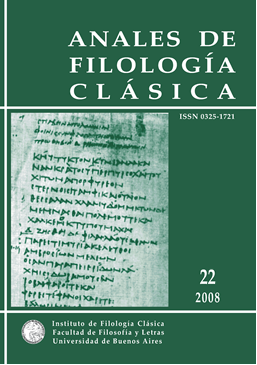La construcción del <i>Éthos</i> discursivo en la parábasis de <i>Avispas</i>
Abstract
El trabajo se propone analizar la construcción del éthos del enunciador‐autoren la parábasis de Avispas, empleando como marco teórico el abordaje retórico de Aristóteles y los aportes de Maingueneau (2002) al problema del éthos efectivo. En primer lugar, identifica los recursos argumentativos implementados en esta parábasis, que contribuyen a elaborar un éthos positivo del poeta y revestirlo de auctoritas. En segundo término, toma en consideración la imagen que el enunciador‐autor construye de sí mismo en obras anteriores como parte del éthos previo que refuerza la imagen presente en Avispas.The aim of this work is to analyze the construction of the éthos of the enunciador‐author in the parabasis of Wasps, employing as theoretical framework the rhetorical approach of Aristotle and the contributions of Maingueneau (2002) to the problem of the efective éthos. In the first place, identifies the argumentative resources implemented in this parabasis, that contribute to elaborate a positive éthos of the poet and provides him with auctoritas. In second term, takes in consideration the image that the enunciador‐author constructs of itself in previous works as part of the previous éthos that reinforces the image elaborated in Wasps.Downloads
I dati di download non sono ancora disponibili
Come citare
Schere, M. J. (1). La construcción del <i>Éthos</i> discursivo en la parábasis de <i>Avispas</i>. Anales De Filología Clásica, (22), 139-159. https://doi.org/10.34096/afc.v0i22.413
Fascicolo
Sezione
Artículos
Los autores/as que publiquen en esta revista aceptan las siguientes condiciones:
- Los autores/as conservan los derechos de autor y ceden a la revista el derecho de la primera publicación, con el trabajo registrado con la licencia de Atribución-CompartirIgual 4.0 Internacional (CC-BY-SA 4.0) de Creative Commons, que permite el uso comercial de la obra y de las posibles obras derivadas, la distribución de las cuales se debe hacer con una licencia igual a la que regula la obra original.
- Los autores/as pueden realizar otros acuerdos contractuales independientes y adicionales para la distribución no exclusiva de la versión del artículo publicado en esta revista (p. ej., incluirlo en un repositorio institucional o publicarlo en un libro) siempre que indiquen claramente que el trabajo se publicó por primera vez en esta revista.
- Se permite y recomienda a los autores/as a publicar su trabajo en Internet (por ejemplo en páginas institucionales o personales) antes y durante el proceso de revisión y publicación, ya que puede conducir a intercambios productivos y a una mayor y más rápida difusión del trabajo publicado (vea The Effect of Open Access).
En ningún momento se cobrará monto alguno al autor por la publicación en esta revista.







